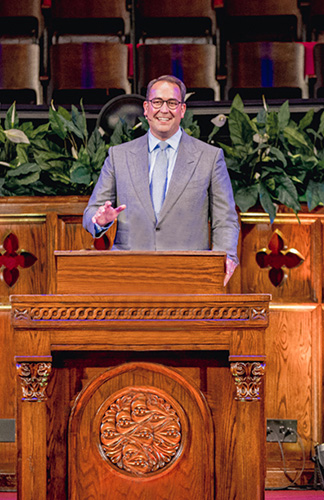When the Wrong Candidate Gets Elected
So, what do we do when our candidate—the one we believe God wanted us to vote for— does not get elected to office? Worse, what if someone we believe will actually harm our country is elected in a landslide?
What now?
Actually, as believers we can take heart, for our hope lies beyond the political process. The real battle in this nation is not political, nor even moral. Back behind the so-called “culture wars” is a theological battle that rages, for the most part, undetected by the human eye. For example, the reason we have different sexual mores is because we have worshippers of two different Gods. Speaking of homosexuals Paul writes, “Claiming to be wise, they became fools, and exchanged the glory of the immortal God for images resembling mortal man and birds and animals and reptiles” (Rom 1:22, 23, ESV). The basic question in this country is not “what political party do you belong to?” but “what God will you worship?”
We must press that debate in our personal witnessing and the opportunities we have to speak to a culture that has lost its way.
Second, if you agree that the battle is primarily spiritual and not political, then you will agree that we must fight using the right weapons. On several occasions I have been in the Wartburg Castle in Germany, where it is said Luther threw an inkwell at the devil. In the Lutherstube (Luther’s study) tour guides used to rub a bit of soot on the wall to show where the inkwell hit, so as not to disappoint the tourists! But I have doubts that Luther threw an inkwell at the devil. In his “Tabletalks” he said he “fought the devil with ink.” I think he meant that he fought the devil by translating the entire New Testament into German in just 10 weeks while living in the castle!
An inkwell, even if well thrown, will not frighten the devil. But the Bible will defeat our foe. Our weapons are to pray, seek God, gather our courage, and personally reach out with a loving witness to lost Republicans, Democrats, and Independents.
Finally, we must keep in mind that the strength of our churches is not dependent on whether we curry favor with the political forces as they exist. Incredibly, the church in China today is 30 million strong despite persecution and every imaginable restriction to sharing the Gospel. As Augustine would put it, the city of God does not depend upon the city of man for its existence and strength.
None of this is to suggest that politics is unimportant, or that we should abandon political involvement. If we withdraw from politics we only contribute to the further downward spiral of our political process and the disappointing leaders we often end up electing. And yet, while we work to better the outcome of elections, our focus is on the spiritual battles that even more directly affect the moral and spiritual climate of our nation. We take our citizenship on earth seriously, but as citizens of heaven we exude hope because we believe that God is ultimately in charge of what happens in His world.
When the wrong candidate is elected, we will only be discouraged if we focus on our newspapers more than we do our Bibles. Our hope in a better world enables us to be optimistic in this confused age in which we are called to represent our triumphant Lord.
The Relationship between FAITH and VOTING
Where do our faith and our politics intersect? Even more confusing, what happens when the political situation in our country conflicts with what we know God wants? Pastor Lutzer has given a lot of thought to these issues, and we asked him to share some of his conclusions with us.
Q: Do you think that some Christians have overemphasized the role politics plays in our nation’s future?
A: Yes, I do. Maintaining the right balance is difficult, but in my opinion we have made some big mistakes. For example, some ministers of the Gospel have publicly backed political candidates which, in my opinion, is wrong. For one thing, that gives the impression that one party is the “Christian party” when in point of fact, there is no “Christian party” in America in any significant sense of that term. And, I might add, we all know Christian candidates who have ended up disappointing us.
Q: Do you believe that unless we keep the issues clear, the Gospel itself could be compromised?
A: Exactly. As preachers we must stand apart from endorsements so we can preach the Gospel to both parties. Here at The Moody Church, I’m sure that we have a good percentage of our congregation that votes Democratic. I preach on issues, but I do not endorse candidates or parties. Both Republicans and Democrats are welcome here—and both are headed for an eternity apart from God unless they repent and believe the Gospel.
Q: To what extent should Christians be involved in politics?
A: Christians should be found on every level of political involvement, seeking to get their candidate elected and running for office if God calls them to that vocation. Yes, politics is a game of compromise, but I don’t think Christian candidates have to compromise their basic honesty and integrity when they enter the political world. The pressures are enormous, but to be willing to sacrifice your political career for principle—that would be a welcome surprise we’d all like to see, and God would be pleased.
Q: Should we be single issue voters?
A: That is huge, because for us, issues such as abortion and homosexual marriage are incredibly important. So I personally would vote for a credible candidate who was opposed to both of these national scourges. On the other hand, there are other issues that are also important, so no candidate is right on everything or wrong on everything.
Q: What does the New Testament say about politics and Christians?
A: That’s a good question because it gives me the opportunity to point out that the early church had no political power but nevertheless did very well in positively impacting the culture of the day. Of course that does not mean they would have avoided political involvement if they had the opportunity, but it does prove the point that the fortunes of the church are not directly linked to the kind of political regime that is in power.
Jesus said that we were to give to Caesar what belonged to Caesar and to God what belonged to God. Paul taught that we are to pray for our leaders (even if they were evil, as was Nero), we are to pay taxes, and obey the government, assuming we are not violating our conscience.
My bottom line is that despite political setbacks, we as the Church must move forward on our knees regardless of who is elected.



